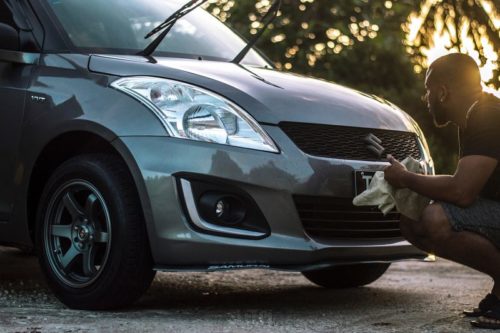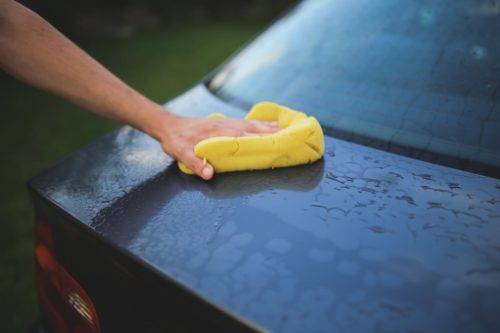Natural Ways to Clean Your Vehicle [Avoid Rust & Harmful Chemicals!]
Discover effective and eco-friendly ways to clean your vehicle naturally and save on insurance. Explore DIY solutions, green products, and water-saving techniques for a sparkling car without harmful chemicals. Enhance your car's shine and protect the environment with sustainable cleaning practices. Get valuable insurance tips and find the best policies to ensure comprehensive coverage for your vehicle.
Read more Secured with SHA-256 Encryption





Table of Contents
Table of Contents


Published Insurance Expert
Melanie Musson is the fourth generation in her family to work in the insurance industry. She grew up with insurance talk as part of her everyday conversation and has studied to gain an in-depth knowledge of state-specific insurance laws and dynamics as well as a broad understanding of how insurance fits into every person’s life, from budgets to coverage levels. Through her years working in th...
Melanie Musson


Licensed Insurance Agent
Dan Walker graduated with a BS in Administrative Management in 2005 and has been working in his family’s insurance agency, FCI Agency, for 15 years (BBB A+). He is licensed as an agent to write property and casualty insurance, including home, life, auto, umbrella, and dwelling fire insurance. He’s also been featured on sites like Reviews.com and Safeco. He reviews content, ensuring tha...
Daniel Walker
Updated October 2024
Welcome to our comprehensive guide on Natural Ways to Clean Your Vehicle.

In this article, we’ll explore a range of eco-friendly methods and tips to keep your car sparkling clean while minimizing harm to the environment. From DIY solutions and green products to water-saving techniques and sustainable cleaning practices, we’ve got you covered. Letting rust form on your vehicle compromises its structural integrity, making your car unsafe to drive.
Learn how to avoid harmful chemicals, discover safe alternatives, and enhance your car’s shine without compromising on insurance coverage. To ensure you’re getting the best rates, simply enter your ZIP code below and compare quotes from top insurance providers. Let’s dive in and make your car cleaning routine both natural and cost-effective.
What Cleaners You Should Avoid
As a rule of thumb for deciding on whether or not a certain product uses “green” ingredients — read the labels!
Generally, if your car wash soap has one of these chemicals in it, they are NOT safe:
- Quaternary Ammonium Compounds – These are also known as QUATS. They’re found in most household cleaners and are labeled as “antibacterial.” They are a major skin irritant, especially for younger children. A great, safe, and green alternative is vinegar.
- Phosphate, surfactants, triclosan – These are often labeled as “antibacterial” ingredients but are extremely harmful to aquatic life that may be affected if you allow the run-off from your car to go into a storm drain.
- Ammonia – This is a truly detrimental chemical. Found most often in glass cleaners, ammonia is a lung irritant that can induce asthma and other long-lasting effects. You might want to consider using vodka or toothpaste to clean up your windows, especially if you enlist the kiddos to help.
- Perchloroethylene or “PERC” – Found in carpet and upholstery cleaners, this one is especially dangerous. As a neurotoxin, perchloroethylene (PERC) can affect the brain and cause painful headaches if inhaled. Three cups of water, ¾ cup of a vegetable-based liquid soap, and 10 drops of peppermint essential oil will make your carpets look like new without any harmful side effects.
Even if you check the label and none of the above ingredients are mentioned, still take precautions.
If there’s a chemical in the list of ingredients you don’t recognize, look it up.
Basically, the only ingredient for a good, clean scrub is lye. Other things to avoid in soaps and cleaners are excessive fragrances, lard, tallow, and parfum.

Free Auto Insurance Comparison
Compare Quotes From Top Companies and Save
Secured with SHA-256 Encryption
Small Changes You Can Make
Now that we’ve got the big dangerous stuff already covered, let’s get into the nitty-gritty of how to have an eco-friendly car wash.
If you use it to clean your car, we probably found a green, healthy, organic alternative.
Antibacterial Soap vs DIY Biodegradable Soap
Combine liquid dishwashing detergent, sustainable laundry detergent, and three gallons of water, and you’ve got yourself a green, clean, dirt-fighting machine!
Remember to always check that any ingredients you use for your mixture are chlorine and phosphate-free, as well as non-petroleum based.
Average Garden Hose vs Hose with a Shut-off Valve
This minor modification will reduce possible runoff from your lawn. Another great alternative to wasting tons of water with a hose (leaky or not) is to simply use a bucket and sponge.
A hose can waste 6 gallons every minute, but using a bucket and sponge only uses a few gallons!

Big Yellow Sponge vs Real Sea Sponge
The process to mold sea sponges into something we humans can use is very eco friendly; there are no harmful byproducts that result, and there is little waste since any excess is ground up and recycled back into the mix.
You can also go one water-saving step further. Instead of throwing dirty sponges in the washing machine, microwave them. Disinfect your natural sponge by soaking them in vinegar or boiling them with water.
If you’re still concerned about any environmental effects of collecting natural sponges for commercial use, rest assured because there are other alternatives.
You can use rags made from sustainable fibers like hemp and bamboo or sponges made from corn fibers, coconut husks, coconut coir fiber, plant-based cellulose, or a combination of agave and nylon fibers.
Tire Cleaners vs Water-Based Tire Dressings
Be careful though when applying these dressings.
While they seem like the perfect, eco-friendly option, they can dry and/or crack the surface of your tires if applied incorrectly.
Armor All vs DIY “Armor All”
We found a great DIY Armor All wipes recipe here that is environmentally friendly and ends up costing only $0.02 to make.
The basic ingredients are as follows:
- Distilled water
- Baby oil
- Vinegar
- Dawn soap
- Melaleuca oil
Harsh Light Cleaner Chemicals vs DIY Light Cleaner
Having a murky headlight can diffuse the light from the perspective of the driver which reduces forward visibility. Conversely, headlights can project higher light levels toward oncoming vehicles which then blind an oncoming driver.
You can use soap, baking soda, and vinegar to clean your car’s headlights. You can also use toothpaste, water, and a toothbrush to bustle away that grime.
Windex vs DIY Window Cleaner
An unconventional window cleaner is Coke. Coca Cola can make your windows shine like new!
You can reduce your waste, eliminate toxins from your home, and save a ton of money each year by making your own window cleaner solution with lemon juice, white vinegar, and water.
That being said, always keep an eye out for DIY recipes that are actually harmful to the environment — if they use ammonia or dish soap, steer clear!
High-powered Laundry Mat vs DIY Carpet Cleaner
Mix equal parts vinegar and water into a spray bottle, then spray the stain. Allow the spot to soak for a few minutes, and then blot the stain with a damp rag.
If you have grease stains on the carpets, sprinkle the stains with cornstarch. Let it sit for 15-30 minutes and dab up.
Look here: Our comprehensive list of natural DIY cleaners you can make at home.

Saving money by using natural household cleaning products isn’t the only easy way to help your wallet grow. Check out our car insurance guide to help you understand the various types of coverage and help you find the best policies in your area.

Frequently Asked Questions
What are some natural ways to clean the interior of my vehicle?
Some natural ways to clean the interior of your vehicle include using baking soda to remove odors and stains, vinegar and water solution to clean windows and mirrors, and a mixture of water and a few drops of essential oil to freshen up the air.
Can I use natural products to clean the exterior of my vehicle?
Yes, there are several natural products that can be used to clean the exterior of your vehicle, such as using a mixture of water and vinegar to clean windows and a baking soda and water solution to clean rims and tires.
How do I use baking soda to clean my vehicle?
Baking soda can be used to clean various surfaces in your vehicle. For example, to clean seats, sprinkle baking soda onto the seats and let it sit for a few minutes before vacuuming it up. To remove stubborn stains, mix baking soda with water to create a paste, apply it to the stain, and let it sit for a few minutes before wiping it away.
How can I remove bad odors from my vehicle naturally?
To remove bad odors from your vehicle naturally, you can sprinkle baking soda on the carpets and seats, let it sit for a few hours, and then vacuum it up. You can also place an open container of vinegar or coffee grounds in your vehicle overnight to absorb odors.
Are natural cleaning products as effective as traditional cleaning products?
Natural cleaning products can be just as effective as traditional cleaning products when used properly. However, it is important to note that some stains and odors may require stronger, chemical-based cleaning products.
Are natural cleaning products better for the environment?
Yes, natural cleaning products are typically better for the environment because they do not contain harsh chemicals that can be harmful to the environment.
Get a FREE Quote in Minutes
Insurance rates change constantly — we help you stay ahead by making it easy to compare top options and save.








